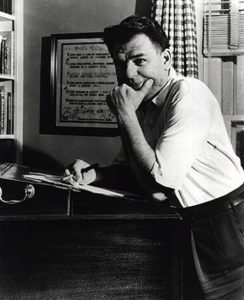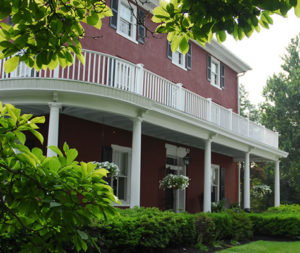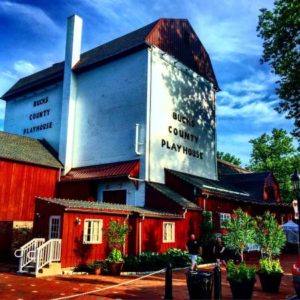 “Laws are sand, customs are rock. Laws can be evaded and punishment escaped, but an openly transgressed custom brings sure punishment.”
“Laws are sand, customs are rock. Laws can be evaded and punishment escaped, but an openly transgressed custom brings sure punishment.”
Mark Twain, “The Gorky Incident”
Terry Teachout on the arts in New York City
 The National Endowment for the Arts has announced the names of its four Jazz Masters for 2019. One of the recipients of the award, the highest honor that the United States bestows on jazz artists, is my old friend Maria Schneider, whom I have known for more than a quarter of a century.
The National Endowment for the Arts has announced the names of its four Jazz Masters for 2019. One of the recipients of the award, the highest honor that the United States bestows on jazz artists, is my old friend Maria Schneider, whom I have known for more than a quarter of a century.
In addition to writing about Maria many times in this space and elsewhere, I contributed the liner notes to her second album, Coming About, which was originally released in 1996. They were based in part on a profile that I published in The Wall Street Journal two years earlier—the first piece, so far as I know, ever to written about Maria outside the jazz press. In it I said that she was “regarded by a rapidly growing number of insiders as one of the most promising young jazz composers in the world.” Now the whole world knows of her greatness, and I am proud beyond belief to have played a part in bringing her to the attention of the public at large.
To read that piece, go here.
 Here’s my list of recommended Broadway, off-Broadway, and out-of-town shows, updated weekly. In all cases, I gave these shows favorable reviews (if sometimes qualifiedly so) in The Wall Street Journal when they opened. For more information, click on the title.
Here’s my list of recommended Broadway, off-Broadway, and out-of-town shows, updated weekly. In all cases, I gave these shows favorable reviews (if sometimes qualifiedly so) in The Wall Street Journal when they opened. For more information, click on the title.
BROADWAY:
• The Band’s Visit (musical, PG-13, all shows sold out last week, reviewed here)
• Dear Evan Hansen (musical, PG-13, all shows sold out last week, reviewed here)
• Hamilton (musical, PG-13, Broadway transfer of off-Broadway production, all shows sold out last week, reviewed here)
• My Fair Lady (musical, G, virtually all shows sold out last week, reviewed here)
OFF BROADWAY:
• Carmen Jones (musical, PG-13, closes Aug. 19, reviewed here)
• Symphonie Fantastique (abstract underwater puppet show, G, closes Sept. 2, reviewed here)
IN GARRISON, N.Y.:
• Richard II (Shakespeare, PG-13, closes Aug. 26, reviewed here)
• The Taming of the Shrew (Shakespeare, PG-13, closes Aug. 24, reviewed here)
CLOSING NEXT WEEK OFF BROADWAY:
• Conflict (drama, PG-13, closes July 21, reviewed here)
CLOSING SUNDAY ON BROADWAY:
• Angels in America (two-part drama, R, alternating in repertory, virtually all shows sold out last week, reviewed here)
In this week’s Wall Street Journal “Sightings” column, I write about the country home of Oscar Hammerstein II, which is in the process of being turned into a museum. Here’s an excerpt.
* * *
 Seventy-six years ago, Oscar Hammerstein II was pacing around the second-story study of the Pennsylvania farmhouse to which he and his family had moved in 1940, trying to figure out how best to set a new Broadway musical in motion. A homely tale of rural life in the Oklahoma Territory, it was to be his first collaboration with Richard Rodgers, and the two men had decided that the show would start out simply, with a woman sitting alone on stage churning butter while a cowboy was heard singing in the wings. As Hammerstein gazed out his window at a cornfield, something clicked in his mind. He soon came up with this plain-spoken couplet: “The corn is as high as an elephant’s eye/An’ it looks like it’s climbin’ clear up to the sky.” Seven months later, the curtain of the St. James Theatre went up, Alfred Drake sang those words, and “Oklahoma!” got under way.
Seventy-six years ago, Oscar Hammerstein II was pacing around the second-story study of the Pennsylvania farmhouse to which he and his family had moved in 1940, trying to figure out how best to set a new Broadway musical in motion. A homely tale of rural life in the Oklahoma Territory, it was to be his first collaboration with Richard Rodgers, and the two men had decided that the show would start out simply, with a woman sitting alone on stage churning butter while a cowboy was heard singing in the wings. As Hammerstein gazed out his window at a cornfield, something clicked in his mind. He soon came up with this plain-spoken couplet: “The corn is as high as an elephant’s eye/An’ it looks like it’s climbin’ clear up to the sky.” Seven months later, the curtain of the St. James Theatre went up, Alfred Drake sang those words, and “Oklahoma!” got under way.
I stood in that same room last week and looked out that same window. You can, too.
The homes of innumerable historical figures have been restored to their original condition and turned into “house museums” that tell the stories of their owners’ personal and professional lives. In addition to such familiar examples as Monticello and Mount Vernon, there are countless other house museums throughout America that once belonged to celebrated artists of every kind. Augustus Saint-Gaudens’ New Hampshire home and studios, Edith Wharton’s country estate in Massachusetts, Frank Lloyd Wright’s self-designed houses in Arizona, Chicago and Wisconsin: All are open to the public and are visited by tens of thousands of tourists each year….
 Highland Farm, Oscar Hammerstein II’s country house in Doylestown, Pa., a two-hour drive from the St. James Theatre, was turned into a bed-and-breakfast in 1988. It’s not open for tours, but you can book a stay by going here. What’s more, Will Hammerstein, Oscar’s grandson, is now raising funds to purchase the historic property from its present owner and transform it into a full-scale house museum, the Oscar Hammerstein Museum and Theatre Education Center. To do so, he must raise $10 million, with an initial installment of $2 million due in December. If he fails to meet that goal, Highland Farm will instead become an anonymous four-lot subdivision….
Highland Farm, Oscar Hammerstein II’s country house in Doylestown, Pa., a two-hour drive from the St. James Theatre, was turned into a bed-and-breakfast in 1988. It’s not open for tours, but you can book a stay by going here. What’s more, Will Hammerstein, Oscar’s grandson, is now raising funds to purchase the historic property from its present owner and transform it into a full-scale house museum, the Oscar Hammerstein Museum and Theatre Education Center. To do so, he must raise $10 million, with an initial installment of $2 million due in December. If he fails to meet that goal, Highland Farm will instead become an anonymous four-lot subdivision….
I’d always imagined it as resembling the nearby 87-acre estate of Moss Hart, George S. Kaufman’s playwriting partner, a fantastically elaborate residence which a cynical guest is said to have described as looking like “what God could do if He had money.” Not so. Highland Farm isn’t small, but the first thing that struck me when I went inside the 19th-century brick-and-stucco house is how modest it looks. It is, above all, a family home…
* * *
Read the whole thing here.
To learn more about the proposed Hammerstein Museum, go here.
A video feature about Highland Farm:
 Duke Ellington and His Orchestra perform Mercer Ellington’s “Things Ain’t What They Used to Be” in a studio performance featuring Johnny Hodges on alto sax. This clip, part of a series of jazz-related featuretttes produced by the Goodyear Tire Company, was filmed in New York on January 9, 1962:
Duke Ellington and His Orchestra perform Mercer Ellington’s “Things Ain’t What They Used to Be” in a studio performance featuring Johnny Hodges on alto sax. This clip, part of a series of jazz-related featuretttes produced by the Goodyear Tire Company, was filmed in New York on January 9, 1962:
(This is the latest in a series of arts- and history-related videos that appear in this space each Monday, Wednesday, and Friday)
 Mrs. T and I spent most of last week at Bridgeton House on the Delaware, the Bucks County inn where we try to go for a few days at least once a year. I spent my first night there in 2005, back when I was still learning how to take vacations, and I brought Mrs. T there not long after we met. We’ve been going back at regular intervals ever since. Not only is Bridgeton House tranquil and ideally comfortable, but the breakfasts are delicious and the wonderful staff treats us like visiting royalty. To be sure, it was viciously hot all week long, but that didn’t matter, at least not too much: we were more than content to stay indoors and look at the sweltering world from a safe distance through our windows, watching the Delaware River during the day and the fireflies at night.
Mrs. T and I spent most of last week at Bridgeton House on the Delaware, the Bucks County inn where we try to go for a few days at least once a year. I spent my first night there in 2005, back when I was still learning how to take vacations, and I brought Mrs. T there not long after we met. We’ve been going back at regular intervals ever since. Not only is Bridgeton House tranquil and ideally comfortable, but the breakfasts are delicious and the wonderful staff treats us like visiting royalty. To be sure, it was viciously hot all week long, but that didn’t matter, at least not too much: we were more than content to stay indoors and look at the sweltering world from a safe distance through our windows, watching the Delaware River during the day and the fireflies at night.
 I hardly ever have the luxury of taking holidays unadulterated by work, and this one, to put it mildly, was no exception. The truth is that I’d come to Bucks County to review a show, Hunter Foster’s Bucks County Playhouse revival of the stage version of 42nd Street, a much-loved musical that (incredibly) I’d never seen, and to visit Oscar Hammerstein’s farmhouse, about which I’ve written a “Sightings” column that will run later this week in The Wall Street Journal, a couple of days before my 42nd Street review appears in the paper. A journalist’s job, alas, is rarely done.
I hardly ever have the luxury of taking holidays unadulterated by work, and this one, to put it mildly, was no exception. The truth is that I’d come to Bucks County to review a show, Hunter Foster’s Bucks County Playhouse revival of the stage version of 42nd Street, a much-loved musical that (incredibly) I’d never seen, and to visit Oscar Hammerstein’s farmhouse, about which I’ve written a “Sightings” column that will run later this week in The Wall Street Journal, a couple of days before my 42nd Street review appears in the paper. A journalist’s job, alas, is rarely done.
Still, the two of us scraped together a modest amount of time to ourselves, and we spent virtually all of it doing nothing in particular. We slept late, ate well, took naps, and generally pulled ourselves together after a stressful stretch. I reread Harvey Sachs’ Toscanini: Musician of Conscience, James Gould Cozzens’ Guard of Honor, and Brian Rees’ 1999 biography of Camille Saint-Saëns, a composer in whose life and music I grow steadily more interested. Meanwhile, Mrs. T chipped away cheerfully at a couple of mysteries, and on our free evenings we watched two golden-age movies, Frank Borzage’s History Is Made at Night and Mitchell Leisen’s Midnight, that a good friend had copied for us. Another friend drove out to Bucks County and joined us for our visit to the Hammerstein house, which added to our pleasure. All in all, we could scarcely have had a much happier time.
 On Saturday we drove home, refreshed and restored, and yesterday I set to writing in earnest. Today I take the train into Manhattan to see two shows, Tracy Letts’ Mary Page Marlowe and the Irish Rep’s revival of On a Clear Day You Can See Forever. I’ll return to Connecticut and Mrs. T on Thursday. Even when you have, as I do, the best job in the world, you can’t help but regret every second that you spend away from the side of the partner who makes your life worth living.
On Saturday we drove home, refreshed and restored, and yesterday I set to writing in earnest. Today I take the train into Manhattan to see two shows, Tracy Letts’ Mary Page Marlowe and the Irish Rep’s revival of On a Clear Day You Can See Forever. I’ll return to Connecticut and Mrs. T on Thursday. Even when you have, as I do, the best job in the world, you can’t help but regret every second that you spend away from the side of the partner who makes your life worth living.
* * *
Charlie Haden and Pat Metheny play “Two for the Road,” by Henry Mancini and Leslie Bricusse:
An ArtsJournal Blog